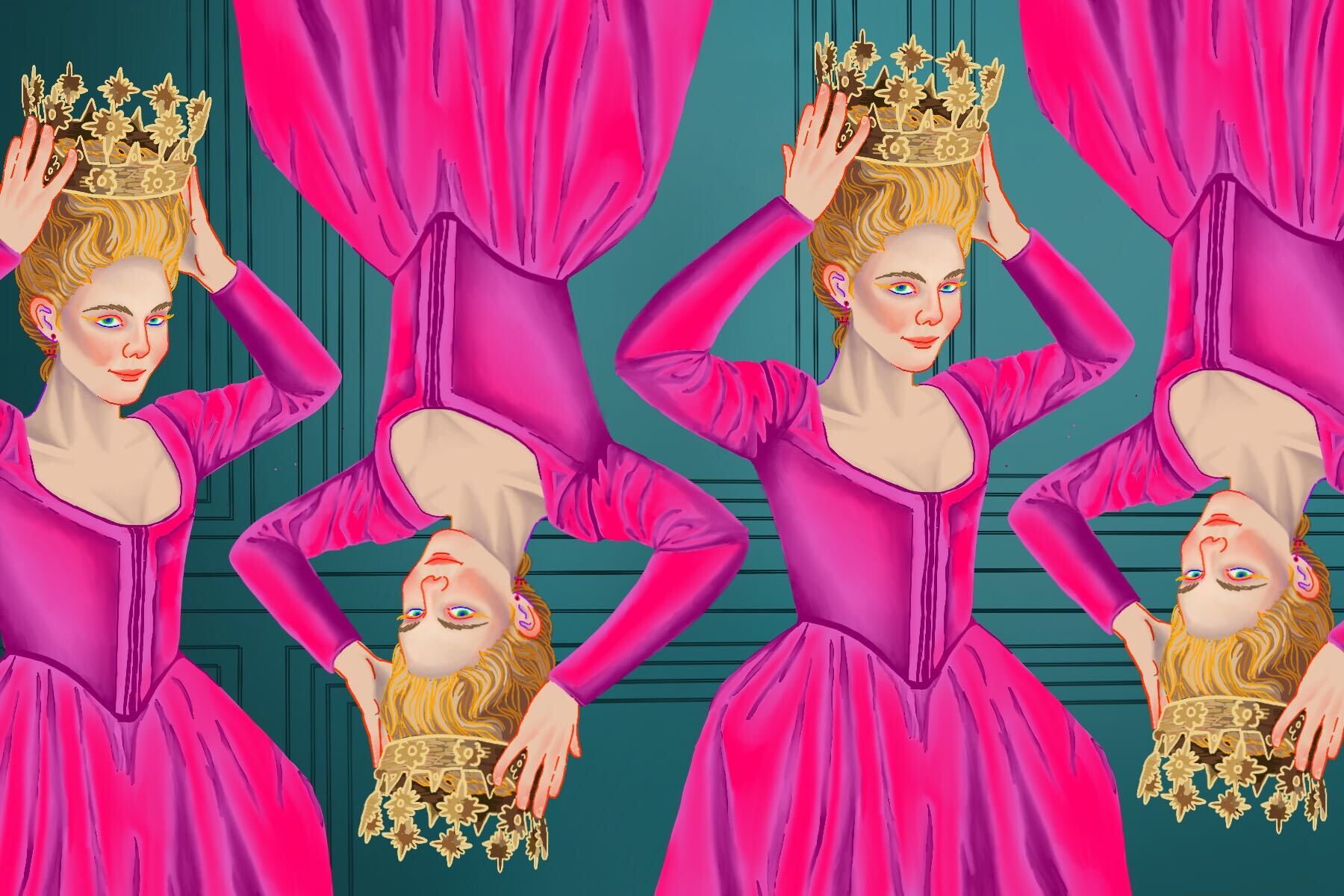In times of crisis, it’s only fitting that we turn to escapism as a coping mechanism. For myself and others like me, that largely involves a mindless foray into a television fantasy. Hulu’s “The Great,” a period television piece based on the story of Catherine the Great’s marriage to Emperor Peter of Russia (and her eventual coup and consolidation of power), seemed to fit the bill.
What I wanted from “The Great,” then, was simple. I longed for corsets and high cheekbones, magnificent set decoration and explosive drama. I wanted a period piece that did not resemble my pandemic-ravaged reality in any way, and I wanted to watch Elle Fanning prance around in dresses and drink champagne on my computer screen.
“The Great” gave me more than what I bargained for. There’s plenty of corsets, and the imagery is beautiful (if not utterly enchanting). The show’s real delight, however, is its ability to make an over-the-top, bizarre period piece feel so timely. The combination of thoughtful writing, poignant performance and an exquisite gem of a story work in perfect harmony. The themes of the show nod to the types of conversations still worth having today, despite the difference in era. Most importantly, “The Great” does it all without ever taking itself too seriously.
https://www.youtube.com/watch?v=hJGedvRfHYg
Character-driven stories make for great, if not categorically better, television. In “The Great,” this lesson is taken very much to heart. The honest and raw portrayal of a handful of well-crafted characters (which include complex women and people of color) are incredibly believable as they navigate life in the Emperor’s palace. Rather than going to great pains to fit some image of royal court life, the show’s cast and crew abandon pretense.
They let the characters play to the character, not to the time, and are able to create something extraordinary. Fanning’s Empress Catherine, Hoult’s Emperor Peter, and the rest of the endlessly talented ensemble’s characters are genuine. Period dramas are often unable to pull off this authenticity, to the show’s (and actors’) eternal credit.
With so many remakes, tropes and even stereotypes often pervading television screens, it is delightfully refreshing to find productions that catch viewers off guard in this way. No one character’s journey is lazy or relies on a caricature. This is an astounding feat, particularly for a period piece that could so easily lean on historical norms and biographies. These tropes, compounded by some appropriate set decoration, can create a sense of nostalgia and romanticized history. Directors often feel this can replace the need for good writing and well-developed characters. “The Great” knows better.
No single decision, line or quirk is taken for granted. Each storyline and conversation exist as an opportunity for the actors and writers to reveal something increasingly complex and rich about each character. This deep dive feels particularly fruitful at a time when entertainment seems to have lost its currency of newness and discovery.
The mean girls at court who torment but come to love Catherine are not merely rude or privileged. They are savage political animals and so clearly do more than wait around for times to change.
The charming boy that Catherine falls for is a gentle romantic who spends much of his character arc not only falling in love with Catherine, but also finding a way to acknowledge the privilege that has allowed him to be so gentle in such turbulent times.
The scatter-brained aunt, the clear matriarch of the show, kills a child for the good of the nation. Emperor Peter, Catherine’s husband and undoubtedly the villain of the story, breaks everyone’s heart as he works to undo years of emotional abuse — and, in fact, succeeds in becoming less vicious.
Even Voltaire, portrayed briefly in the finale episode, is a foul-mouthed Frenchman whose ideas on progress are predicated on his own understanding that sometimes humanity comes at the price of bloodshed — a price Catherine must learn to pay.
Even in a plot that includes murders, torture, a war and an outbreak of smallpox, the emphasis on the character is never forgotten. Each is allowed moments of anger, tenderness, serenity and chaos. The relationships between the characters are nuanced and complex, and the spaces they move through to reach one another are demonstrated masterfully.
The best quality of “The Great” is its element of surprise. The plot thickens gracefully, and circumstances change so quickly that the viewer hardly has time to keep up. I found myself pausing frequently to turn to my friend and double-check that I hadn’t just missed something.
The episodes work like little pieces of poetry in that way — each moment, word and beat is placed just so for a reason. Details are important, and paying attention is rewarded. Yet there is a difference between using thoughtful twists and a “shock” factor. “The Great” straddles this line perfectly.
So often, particularly in post-“Game of Thrones” era television, shock replaces the function of the surprise that can only come from good writing. A seemingly random death, bout of violence or outburst catches viewers by “surprise” not because it has revealed nuances, but simply because it does not make sense. “The Great” avoids this assiduously.
Again, the show’s writing is poetry — by catching viewers off guard, it makes them see something beyond what is merely written on the page, but not something that was never there to begin with. It is satisfying in a way the modern “shock” factor is not. Once again, this is rewarded — with very real gasps, uproarious laughs and many tears.
It is ultimately Catherine’s narrative that makes this show so relevant and refreshing, elevated as it is by the elegant writing and tasteful decisions of the showrunners. Catherine is an intellectual woman enamored with the work of Enlightenment thinkers. She wants to build a new Russia, one based in reason, empathy and general freedoms we would expect from most of our governments today. She is, to everyone around her, a radical liberal — and is often mocked for her womanly fantasies and supposed idealism.
Catherine may be optimistic, but she is far from an idealist. She doesn’t win the day because she’s pure of heart, uncompromisingly peaceful and a humanitarian. Catherine has flaws, makes quite a few mistakes and is often terrifying. She is remarkably fierce as she follows her quest to power, guided only by her wits and an intuition that she can change the world.
Grounded as she is by her love for her new country and her moral principles, Catherine is always trying to have both. She wants to avoid bloodshed but start a revolution. She wants to gain favor from the court but remain best friends with her servant publicly. It’s dizzying how precariously she walks the line between what she hopes for and what she must do. In the finale, this all comes to a head. She finally must choose, and it is in this that “The Great” shows its exacting, brutally honest nature.
In order for her to win Russia, the man she loves must die. And she lets him. It’s a side of women, particularly women in positions of power, that we don’t get to see too often. Victory, for a female ruler, is seen as the ability to have everything you want, to hold onto the gentlest and most precious parts of yourself even as you grow in power and authority. What “The Great” shows us is that which we already know: With great power comes great sacrifice. Making decisions that are cold, ruthless and brutal, even at the cost of great emotional turmoil, is sometimes what is needed for the good of the nation. It’s not a pleasant lesson, but it’s one that popular culture seems to forget to depict when it comes to female leaders and their portrayals.
Having it all, as it were, was never in the cards for Catherine. And by showing the audience that so clearly, “The Great” allows Catherine to make the hard choices. She must sacrifice a bit of her humanity to save Russia and become the ruler she was meant to be. It’s the biggest surprise of the show, and it’s one that gives the story a takeaway that is far more relevant and modern than the television of months and years past. As enchanting as “The Great” is, it is also incredibly refreshing in its sincerity, setting a standard for original television everywhere.
















